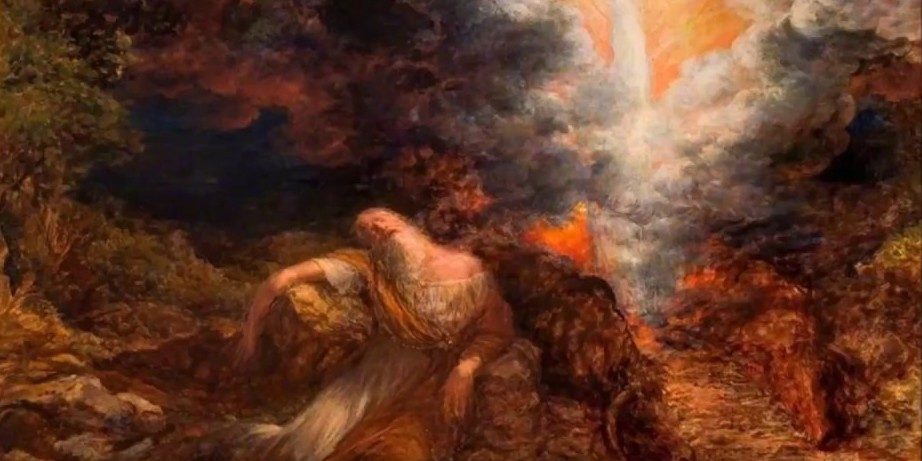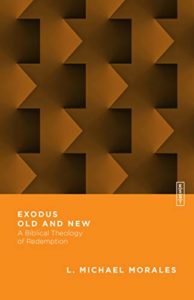
The Exodus Prefigured
LEKH! LEKH! Abram swung his staff vigorously, yelling, “Lekh! Lekh!—Go! Go!” The vultures bounded back several yards, hopping with outspread wings. He turned back to the cutting Yahweh had bidden him to perform. There before him lay the bloody path between the split carcasses of a heifer, a female goat, a ram, and two birds. He had cut the animals in half, laying each side opposite the other, creating a pathway through death. Under the sweltering sun, much of the blood and offal had begun to congeal and the odor had already drawn a horde of flies, not so easily driven off as the vultures (though the vultures patiently lurched closer as soon as he turned his back).
The sun was now beginning to set, and Abram, the sweat of his brow having dried in rivulets of salt around his lids and down his cheeks, knew that soon both the dark and the cold would overtake him. He sat on a large stone, waving his staff rhythmically as a warning signal to the preying scavengers. He was drifting in and out of slumber when, suddenly, a deep sleep fell on him and he was plunged into thick darkness, black as pitch, submerging him in horrific dread—he was full of fear and terror.
Out of the primordial dark, Abram heard the voice of Yahweh: “You must know that your descendants will be strangers in a land not their own. They will slave for the inhabitants and be afflicted by them for four hundred years. But know also that I will judge the nation enslaving them, and afterward your descendants will come out with great possessions.” Then a fire appeared, pushing back the shroud of darkness. Abram watched intently, straining his eyes as the wonder unfolded: A pot with a billowing pillar of smoke and a torch whose flame ascended in a column of blazing fire stood before the cutting, spreading an auburn haze over the slaughter. Steadily, the pillars of smoke and fire began to pass between the carcasses, moving slowly through the path of death. Even before delivering the Israelites out of Egypt, he was the God of the exodus. Click To Tweet
Silent and motionless, Abram exhaled. The cold sweat drenching his body jerked him into movement. Discarding sandals and staff, he sank onto his knees and bowed low until his forehead rested on the ground. Dust and the musky scent of shrubs entered his nostrils as he stretched out his arms before him.
The vision of Yahweh, as recorded in Genesis 15, had confirmed that one day Abram’s seed would be delivered through death and brought in to possess the land of God as an inheritance.
The Exodus of Abraham
God’s character and attributes are changeless. Even before delivering the Israelites out of Egypt, he was the God of the exodus. In this chapter, we will look at the major events in the life of Abraham and find that they were divinely stamped with an exodus impress.
Genesis 12:1-9: Abraham’s exodus out of Ur. Thankfully, Genesis 11 does not end with humanity’s exile from God and the scattering of nations from the ruined city of Babel. The Tower of Babel story (Genesis 11:1-9) and the call of Abram, whom we will come to know as “Abraham” (Genesis 12:1-3), are linked inseparably by the family line of Shem (Genesis 11:10-32). In Hebrew, Shem means “name,” connecting him not only to the primary motivation of the city builders, who wanted to make a name for themselves, but also to Shem’s descendant Abram, to whom God promises, “I will make your name [shem] great” (Genesis 12:2)—a hint that every human longing finds its end in God himself. Indeed, by his grace God offers Abram restoration in terms of everything humanity had sought through defiant self-assertion: his descendants would experience abundant life and security with God in the land.
For our purposes here, it is critical to understand that God called out Abram precisely in order to reverse the exile of the nations. Abraham’s narrative life begins with God’s promise that “in you all the families of the earth shall be blessed” (Genesis 12:3) and ends with his confirming oath that “in your seed all the nations of the earth shall be blessed” (Genesis 22:18). Abram’s call out of Ur, moreover, employs a fivefold use of the Hebrew root for “bless,” likely intended to signal that through Abram’s calling the fivefold “curse” found throughout Genesis 1-11 would finally be undone. As Abraham’s seed, Israel’s vocation will be to bring the light of salvation to the nations, the storyline of Israel culminating with the Messiah’s gathering of a new humanity, of both Jewish people and Gentiles, to dwell in fellowship with God in a new creation. This dawning hope of glory begins with God’s call of Abram to “Go get yourself out of your land, and from your kinfolk, and from your father’s house” (Genesis 12:1, that is, leave all that you know behind, forsaking every defining element of your life—sacrifice your past, your self. In calling Abram out of Ur of the Chaldees, God was delivering an ancient Mesopotamian man, along with his wife Sarai, out of exile and initiating a relationship that would serve as the kernel for all humanity’s new life with God. Click To Tweet
In calling Abram out of Ur of the Chaldees, God was delivering an ancient Mesopotamian man, along with his wife Sarai, out of exile and initiating a relationship that would serve as the kernel for all humanity’s new life with God. The divine call to leave Ur was also a deliverance out of Ur, out of the plight of the nations’ exile. As the first human being to experience a reversal of the spiritual exile narrated in Genesis 11, Abraham himself stands as the firstfruits of an international deliverance—the call out of Ur was, in other words, an exodus. And the goal of Abram’s exodus, the land that Yahweh would show him, was the land of Canaan. Centuries later, Abram’s exodus out of Ur and entry into Canaan would be followed by Israel’s exodus out of Egypt and entry into Canaan.
In Genesis 15 God will proclaim to Abram, “I am Yahweh who brought you out of Ur of the Chaldeans to give you this land to inherit” (Genesis 15:7), a divine declaration—an “exodus formula”—that will be echoed in the proclamation to Israel: “I am Yahweh your God who brought you out of the land of Egypt, out of the house of bondage” (Exodus 20:2; Deuteronomy 5:6). In both instances, God defines himself as his people’s deliverer. To his people Yahweh is, and can only be known as, the God of the exodus.
Genesis 12:10-20: Abraham’s exodus out of Egypt. After his departure from Ur, Abram underwent a deliverance out of Egypt whose outline would later be traced by the Israelites in their own exodus experience. Genesis 12:10-20 narrates Abram’s descent into Egypt due to a severe famine in the land. Fearing the Egyptians would kill him to obtain his wife, Abram bid Sarai to say she was merely his sister. As it turned out, her beauty was reported to the Pharaoh himself, who took her into his harem, giving Abram many sheep, oxen, donkeys, male and female servants, and camels—an enormous hoard of wealth in the ancient Near East.
Yahweh intervened, however; he “plagued Pharaoh and his household with great plagues” (Genesis 12:17) so that Pharaoh sent Abram and his wife away, along with the many possessions Abram had amassed in Egypt. Genesis 13:1 reads: “And Abram ascended out of Egypt, he and his wife and all that he had.” In whatever manner Abram’s behavior may have been understood within the thought-world of the ancient Near East, in the alchemy of divine providence his experience served as a foretaste of Israel’s deliverance out of Egypt.
A severe famine would also lead Jacob and his twelve sons to descend into Egypt (Genesis 41–50), and even as Abram feared he would be killed while his wife would be allowed to live, so the Egyptians would later plot to kill Israelite sons while keeping the daughters alive (Exodus 1:22), presumably to integrate them into Egyptian life by marriage. Just as Yahweh had plagued the Pharaoh who had taken Abram’s wife, causing him to send them away, so too the Pharaoh of the exodus would be plagued until finally he sent the Israelites out (Exodus 7-12). Even the verb used for Pharaoh’s sending Abram and Sarai away (shalach, Genesis 12:20) echoes throughout the exodus narrative (Exodus 3-11), as does his command for them to “take and go” (Genesis 12:19; Exodus 12:31-32).
 Moreover, Abram’s departure out of Egypt with great possessions foreshadowed the plundering of the Egyptians by Israel (Exodus 12:31-36). Many of these parallels are anchored by unique words common to both accounts. For example, Genesis 12:17 and Exodus 11:1 are the first two occurrences of the word “plague” in the Pentateuch, and the “severe famine,” which led Abram to “descend” into Egypt, uses the same vocabulary that describes the “severe famine” that led to Israel’s own “descent” into Egypt (Genesis 12:10; 43:15; 47:4). These and other parallels were brought out by ancient interpreters, underscoring the principle that everything written about Abraham’s children was also written about Abraham himself.
Moreover, Abram’s departure out of Egypt with great possessions foreshadowed the plundering of the Egyptians by Israel (Exodus 12:31-36). Many of these parallels are anchored by unique words common to both accounts. For example, Genesis 12:17 and Exodus 11:1 are the first two occurrences of the word “plague” in the Pentateuch, and the “severe famine,” which led Abram to “descend” into Egypt, uses the same vocabulary that describes the “severe famine” that led to Israel’s own “descent” into Egypt (Genesis 12:10; 43:15; 47:4). These and other parallels were brought out by ancient interpreters, underscoring the principle that everything written about Abraham’s children was also written about Abraham himself.
The preceding excerpt is taken from Exodus Old and New: A Biblical Theology of Redemption by L. Michael Morales. Copyright © 2020 by L. Michael Morales. Published by InterVarsity Press, Downers Grove, IL. www.ivpress.com

